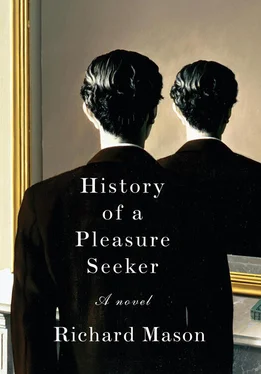One of these preceded Maarten’s arrival by minutes. On finding that a bucket of water had been balanced over the ballroom doors and had drenched the plasterer who dislodged it as well as the newly laid parquet floor, Maarten gave vent to his feelings by firing every one of the twenty laughing bystanders. This sobered even Mr. Dermont, who conducted his Dutch partner and his wife to the Hotel Metropole across the street and took the afternoon train for Philadelphia, with his 50 percent share certificate in a black pigskin bag. He had no desire to be present when the decorator presented his latest bill, particularly since he had nothing to contribute toward it. He was rather sick of the whole business and already coming to see himself as the situation’s victim — the man who had bravely shouldered the practical burden and received nothing in return but queries and suspicion and demands for money. He rehearsed this narrative so spiritedly that by the time he reached his destination he entirely believed it. This enabled him to send a brief and unapologetic cable to Maarten—“Relative unwell STOP See you Opening October 1st STOP”—without the faintest twinge of contrition.
On receiving this communication, Maarten locked himself in the marble bathroom of his suite, ripped the telegram into tiny pieces, stamped on them, flushed them down the toilet and spat into the bowl after them. Then he prayed. It was not a happy prayer, and he opened his eyes convinced that the deity had declined to rescue him.
He went into the salon and found his wife with the hotel’s manicurist. The bill presented by this lady depressed him further. He paid it and left the building and took a cup of coffee at Walker’s Café; and when he had paid for this also and left a large tip, he walked slowly toward the Plaza. It is dangerous for a man to peer too closely at the workings of God, he told himself, and took courage from the optimistic blue of the sky.
Above him loomed the vast façade he had called into being. For the first time he saw something marvelous in it and not merely monumental. It was a building that might survive a hundred years and it made him remember what his father had taught him: that there is nobility in anything that endures.
By the time he reached it, he felt better, and before its elaborate doors he made a solemn vow: that he would not let these Americans break him.
The day Maarten Vermeulen-Sickerts fired the Plaza’s decorator, the head of construction, the chief plumber, and a further fifteen, mischief-filled bellboys, Egbert honored his promise to Piet Barol. At the end of the morning’s translation exercise he took from a kid purse his grandfather’s signet ring and put it on his middle finger, which was the only one thick enough to secure it. He had been given this ring at his confirmation and through injudicious experimentation had unlocked with it marvels over which he had no control. Now it frightened him, but he knew he could explain nothing without it.
An alertness to sequence and order was deeply buried in Egbert’s nature, but the tyranny of the Shadowers had not been inevitable. He stood up and went to the piano. Piet was sketching a small table carried down from Jacobina’s sitting room and did not look up. The boy coughed self-consciously and rapped six times with the ring on the piano’s lid. “Listen,” he whispered. “You can hear them.”
Piet raised his head and listened. The ringing strings made a sound like the small talk of ghosts. Egbert knocked again, requesting entry to an invisible universe. It seemed to Piet he caught snatches of waltzes and gavottes and the fast movements of concerti, and that these were all that remained of the people who had played them; who had once been as vigorous as he was and were now dead and forgotten.
Quite abruptly, the young man understood that he would one day lie in the earth and be eaten by wild things. So would the child who stood before him, looking so brave. Piet had met Death early, when it snatched his mother from him; but until this moment he had felt removed from it, as though extinction awaited other people.
“What does this whispering mean?” he asked.
And Egbert told him.
As his son’s demons were growing weaker, Maarten’s were threatening to overwhelm him. He kept this fact secret, especially from his wife, and to the outside world presented a façade of implacable calm that was exhausting to maintain. He dismissed the most important men Mr. Dermont had hired, engaged new builders, watched over them closely, and summoned from Lucerne the maître d’hôtel of his establishment there who took the training of the staff in hand.
A spirit of terrified industry took hold of the site at the bottom of the Central Park, but each small triumph was succeeded by a greater disaster. Ten days before the scheduled opening a fire destroyed a third of the kitchen. Forty-eight hours later, a cistern in the maids’ bedrooms on the top floor exploded, leaving seventeen rooms uninhabitable.
Maarten cabled to Amsterdam for money. He promised favorable terms and deposited $500,000 in the vaults of the Knickerbocker Trust Company, from which he hoped to elicit a further million dollars in credit. His own deposits were sufficient to keep the project afloat while the trust company deliberated, but he would soon need more. He kept on doggedly, determined to win; but though he spent eighteen hours of every day at work, the end of September found him facing a brutal choice: to open as planned, while there were workmen in the building, or delay the project until they had finished.
He decided to open, against all precedent. At once the New York Stock Exchange, which had lost a quarter of its value since the commencement of his hotel, dipped further. He was alerted to this by a screeching newspaper boy, and as he read the headlines he understood that God was willing to break thousands in order to chastise him.
He walked through the Plaza’s lobby and stood beneath the stained-glass ceiling of its Palm Court, thinking of Babylon’s fate. The light outside was fierce and cold and fairies of colored light flitted across the furniture, which smelled of new upholstery and glue. It was a splendid room, but its opulence demanded the presence of patrons with money. If these did not come in their hundreds he would be ruined.
He sat with this thought for some time. Then he went to find his wife. She was in the sitting room of their suite at the Metropole, surrounded by boxes from which Agneta Hemels was removing shoes and cuffs and scarves and gowns, each more ravishing than the next. Finding no way to articulate her dissatisfactions, Jacobina had punished her husband by spending a provocatively large sum of money. She had bought presents for herself and the children and a painting for her aunt at Baden-Baden. As Maarten entered, Agneta was removing from tissue paper a pair of ankle boots in dark blue leather, fastened with nine pink pearls and lined in scarlet. The sight made him angry, then sad. “If you please, Miss Hemels,” he muttered, and when the maid had curtsied and left he said, “I have annoyed you on this trip, my dear.”
“Not at all.”
“I am sorry for it. It was not my intention to displease you.”
“Why ever should I be displeased?”
“I have absolutely no idea, and I cannot make amends until you tell me.”
Jacobina put down the sapphire choker she had taken, on approval, for Constance and looked at her husband. She was very fond of him and in the past he had been an attentive recipient of her few, pathetic secrets. It appalled her to possess a secret she could not share with him. But the recollection of Piet Barol prohibited truthfulness, and instead of saying “You never touch me,” which was what she wanted to say, she smiled and said, “I’m just anxious, darling. I want the hotel to be a success, as you deserve. I promise to be more cheerful.”
Читать дальше












